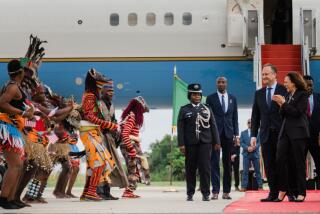Student Will Study Africa at the Source
- Share via
FULLERTON — As people across the country listen to lectures about African-American culture for Black History Month, a student at Cal State Fullerton will fly straight to the source: Africa.
Tiffany Horton, a junior, will leave today to study African politics and international relations for 10 months at the University of Zimbabwe in Harare.
Horton, 20, is the first Fullerton student to take part in the 3-year-old Cal State exchange program in Zimbabwe, a country of 10 million people just north of South Africa. Of the six students going, she is the only African-American.
The official language in Zimbabwe is English, so she will take classes with African students and get full credit.
Horton said she has always wanted to go to Africa. “There’s some type of bloodline, some type of connection,” she explained. She often wears African-print dresses to school and wraps her hair in a colorful batik cloth.
The trip will be partly a search for African identity, Horton said. She will carry with her such questions as: “Is there someone here who looks like me? Is this the group?”
An inspiration for the trip came from a friend who visited the fortresses in Senegal, where captured Africans were kept before being crowded onto slave ships. “Oh, my God . . . this is what happened . . . this is how we got to the United States,” she told Horton.
Dabah C. Dobrinen, the activities coordinator and international program adviser at Fullerton, encouraged Horton to apply for the program. She knew Horton as the chair of the student Assn. for Intercultural Awareness.
“She is very independent, very secure,” Dobrinen said. “She knows what she wants.”
Horton went to high school in New Hampshire but decided to come to California for a cheaper education. She said she wants to be a diplomat.
The trip could help her join the foreign service, said Richard L. Sutter, director of the Cal State international program.
“There’s never been a time when people needed to do more special things with their education,” he said. The global economy and rising number of immigrants to California create new challenges, Sutter said.
“Probably the leaders will be those who have had meaningful intercultural experience,” he added. “She’s got that kind of gumption that will carry her through.”
The trip costs about $12,000, Sutter said, including air fare. Horton said she earned scholarships and took out loans to pay for it.
A few days before her trip, a copy of the guide book “Africa on a Shoestring” lay on Horton’s coffee table. She was busy repacking her suitcase and had to take out two cans of cleanser to make room for a box of nonfat dried milk.
“I like milk on my cereal,” she explained.
Horton also packed five toothbrushes, a handful of ballpoint pens and a 24-pack of pencils. “They do have things there, but you know you have your favorite products,” she said.
More to Read
Sign up for Essential California
The most important California stories and recommendations in your inbox every morning.
You may occasionally receive promotional content from the Los Angeles Times.












